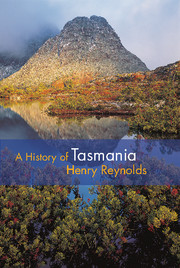Book contents
- Frontmatter
- Contents
- Illustrations
- Acknowledgements
- Introduction
- 1 First Meetings, Extraordinary Encounters
- 2 Van Diemen's Land: Settling in the enviable island
- 3 The Black War: The tragic fate of the Tasmanian Aborigines
- 4 An Indelible Stain?
- 5 The Triumph of Colonisation
- 6 The Politics of Van Diemen's Land
- 7 The Convict System
- 8 Post-penal Depression, 1856–70
- 9 Reform and Recovery
- 10 Federation and War
- 11 Between the Wars
- 12 Postwar Tasmania
- 13 Towards the Bicentenary
- Notes
- Sources
- Index
3 - The Black War: The tragic fate of the Tasmanian Aborigines
Published online by Cambridge University Press: 05 April 2012
- Frontmatter
- Contents
- Illustrations
- Acknowledgements
- Introduction
- 1 First Meetings, Extraordinary Encounters
- 2 Van Diemen's Land: Settling in the enviable island
- 3 The Black War: The tragic fate of the Tasmanian Aborigines
- 4 An Indelible Stain?
- 5 The Triumph of Colonisation
- 6 The Politics of Van Diemen's Land
- 7 The Convict System
- 8 Post-penal Depression, 1856–70
- 9 Reform and Recovery
- 10 Federation and War
- 11 Between the Wars
- 12 Postwar Tasmania
- 13 Towards the Bicentenary
- Notes
- Sources
- Index
Summary
It was an event of global significance and is more widely known than anything else that has happened on the island since the arrival of Europeans. The similar fate which befell other Aboriginal nations in early contact with Europeans has often been obscured by the size and scale of continental Australia. No such attenuation was possible in Tasmania. Settlement of the ‘enviable island’ was invasion and usurpation, partnered with violence, atrocity and the death of all but a small handful of survivors who escaped the overwhelming fate of their kin almost by chance, aided by the isolation of the islands of Bass Strait. While the Tasmanian story is not exceptional when viewed against the backdrop of five centuries of European colonialism, or even the more focused story of Australian settlement, it had an inimitable intensity produced by confined space and compressed time. In just over 30 years the Aboriginal population fell by at least 90 per cent; the survivors were exiled to Flinders Island where deaths accelerated. The greatest of Tasmanian historians, John West, reflected on these tragic events in his history published in 1852. He had arrived in the colony when memories of violence were fresh in the minds of many settlers. ‘From Windmill Hill at Launceston,’ he wrote, ‘whence a wide and beautiful country is visible, the spectator could discern the site of twenty aboriginal murders – settlers, servants, and infants; the aged and the kind had fallen, as well as the base hearted and cruel.’ But while welcoming the Indigenous exile from the Tasmanian mainland he was deeply moved as well:
It was, indeed a mournful spectacle: the last Tasmanian quitting the shores of his ancestor! Forty years before, the first settler had erected his encampment! A change so rapid in the relations of a people to the soil, will scarcely find a parallel in this world's history.
- Type
- Chapter
- Information
- A History of Tasmania , pp. 47 - 67Publisher: Cambridge University PressPrint publication year: 2011



